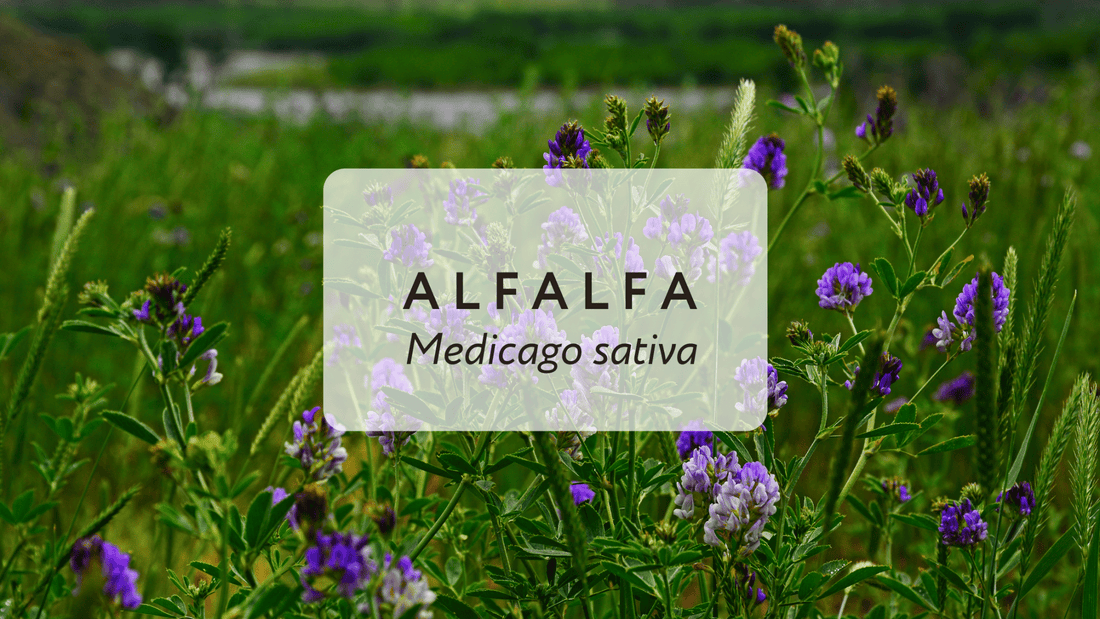What is Alfalfa?
Alfalfa, botanically known as Medicago sativa, is a highly nutritious plant that has been used for centuries. Its botanical name, Medicago, is derived from the Greek word "medike," which means "median" or "middle," indicating its use as a healing herb. This nutrient-rich plant is packed with essential minerals, vitamins, protein, chlorophyll, enzymes, and more.
Why is Alfalfa Beneficial?
Alfalfa offers a wide range of health benefits due to its impressive nutritional profile. Let's explore some of its key advantages:
1. Rich in Iron, Calcium, and Phosphorus
Alfalfa is an excellent source of iron, calcium, and phosphorus, essential minerals that play vital roles in maintaining overall health. Iron is crucial for oxygen transport, calcium is essential for strong bones and teeth, and phosphorus is necessary for energy production and cell function.
2. Packed with Vitamins
Alfalfa contains a variety of vitamins, including vitamins A, D, K, B12, and more. These vitamins are essential for various bodily functions, such as maintaining healthy vision, supporting bone health, promoting healthy blood clotting, and aiding in the production of red blood cells.
3. High Protein Content
Protein is an essential macronutrient that plays a crucial role in building and repairing tissues, producing enzymes and hormones, and supporting overall growth and development. Alfalfa is a great plant-based source of protein, making it an excellent choice for vegetarians and vegans.
4. Abundant in Chlorophyll
Chlorophyll, the pigment responsible for the green color in plants, is known for its detoxifying and antioxidant properties. Alfalfa is rich in chlorophyll, which helps cleanse the body, supports liver function, and promotes overall well-being.
5. Loaded with Minerals and Enzymes
In addition to iron, calcium, and phosphorus, alfalfa contains a wide range of minerals and enzymes that are essential for various bodily functions. These include magnesium, potassium, zinc, and copper, among others. Enzymes present in alfalfa aid in digestion and promote nutrient absorption.
Traditional Uses of Alfalfa
For centuries, alfalfa has been used in traditional medicine to address various health concerns. Some of its traditional uses include:
1. Treating Malnutrition
Due to its high nutritional content, alfalfa has been used to combat malnutrition and provide essential nutrients to the body.
2. Healing Bruises and Wounds
Alfalfa has been traditionally used to promote wound healing and alleviate bruising.
3. Supporting Oral Health
Traditionally, alfalfa has been used to address tooth decay and promote oral health.
4. Managing Anemia
Alfalfa has been used historically for anemia and pernicious anemia, a condition characterized by a deficiency of red blood cells or hemoglobin in the blood.
5. Assisting in Tuberculosis Treatment
Alfalfa has been used as a supportive treatment for tuberculosis, a bacterial infection that primarily affects the lungs of individuals with weak constitutions.
6. Alleviating Ulcers and Urinary Disorders
Alfalfa has been traditionally used to help alleviate all kinds of ulcers and urinary disorders.
7. Supporting Prostate Health
Traditionally, alfalfa has been used to support prostate health and address related issues.
8. Relieving Back Pain and Jaundice
Alfalfa has been used to relieve back pain and jaundice, a condition characterized by yellowing of the skin and eyes.
9. Managing High Cholesterol
Alfalfa is believed to help manage high cholesterol levels, promoting heart health.
10. Enhancing Muscle Tone and Growth
Traditionally, alfalfa has been used to improve muscle tone and support healthy growth.
11. Addressing Arthritis and Rheumatism
Alfalfa has been used to alleviate symptoms associated with arthritis and rheumatism, such as joint pain and inflammation.
12. Supporting Digestive Health
Alfalfa is believed to promote digestive health and address conditions like colitis, an inflammation of the colon.
13. Promoting Wound Healing
Traditionally, alfalfa has been used to support wound healing and tissue repair.
Alfalfa in Pregnancy and Postpartum
Alfalfa has been traditionally used to support women's health during pregnancy and postpartum. It has been used to:
1. Relieve Nausea in Pregnancy
Alfalfa has been used to alleviate nausea and morning sickness during pregnancy.
2. Provide Nutritional Support
During the childbearing year, alfalfa has been used to provide essential nutrients and support overall nutrition.
3. Shorten Postpartum Bleeding
Alfalfa has been traditionally used to help shorten postpartum bleeding.
4. Enrich Breastmilk
Alfalfa has been used to enrich breast milk, providing additional nutrients for the nursing mother and the baby.
With its rich history and numerous health benefits, it's no wonder alfalfa has been highly regarded for centuries. Incorporating alfalfa into your diet or exploring its potential as a natural remedy may offer a range of advantages for your overall well-being.
Prenatal Tea Available for Pre-Order Sept 25th
Mark your calendars! HerbalEmbrace.com will make our new hand-blended organic loose-leaf herbal Prenatal Tea available for PRE-ORDER on September 25th. Join our Email List to get notified first! We'll continue to put up blog features on the other ingredients supporting whole-body health before and during pregnancy!








